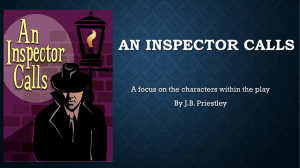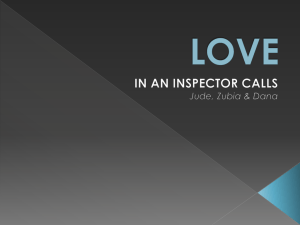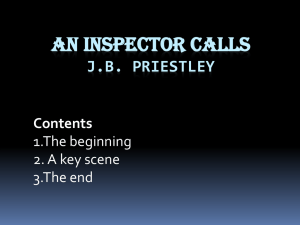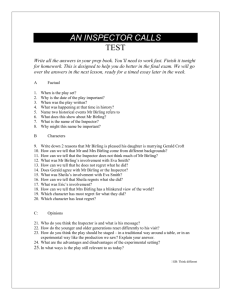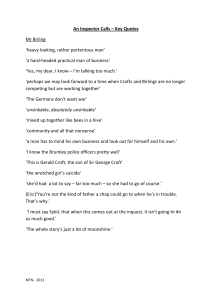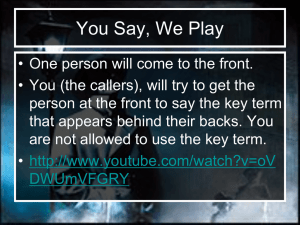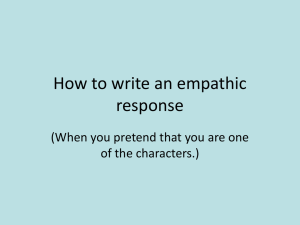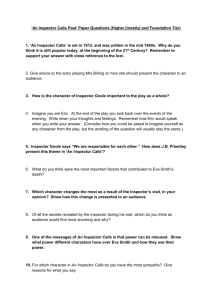File - NealeWEnglish
advertisement
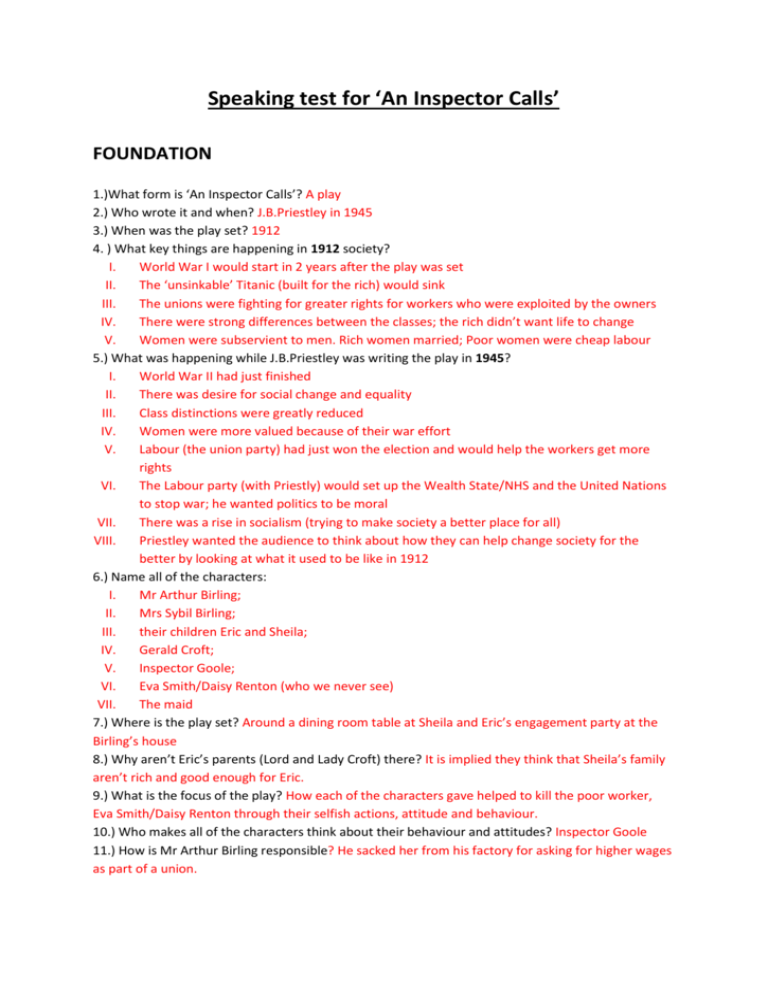
Speaking test for ‘An Inspector Calls’ FOUNDATION 1.)What form is ‘An Inspector Calls’? A play 2.) Who wrote it and when? J.B.Priestley in 1945 3.) When was the play set? 1912 4. ) What key things are happening in 1912 society? I. World War I would start in 2 years after the play was set II. The ‘unsinkable’ Titanic (built for the rich) would sink III. The unions were fighting for greater rights for workers who were exploited by the owners IV. There were strong differences between the classes; the rich didn’t want life to change V. Women were subservient to men. Rich women married; Poor women were cheap labour 5.) What was happening while J.B.Priestley was writing the play in 1945? I. World War II had just finished II. There was desire for social change and equality III. Class distinctions were greatly reduced IV. Women were more valued because of their war effort V. Labour (the union party) had just won the election and would help the workers get more rights VI. The Labour party (with Priestly) would set up the Wealth State/NHS and the United Nations to stop war; he wanted politics to be moral VII. There was a rise in socialism (trying to make society a better place for all) VIII. Priestley wanted the audience to think about how they can help change society for the better by looking at what it used to be like in 1912 6.) Name all of the characters: I. Mr Arthur Birling; II. Mrs Sybil Birling; III. their children Eric and Sheila; IV. Gerald Croft; V. Inspector Goole; VI. Eva Smith/Daisy Renton (who we never see) VII. The maid 7.) Where is the play set? Around a dining room table at Sheila and Eric’s engagement party at the Birling’s house 8.) Why aren’t Eric’s parents (Lord and Lady Croft) there? It is implied they think that Sheila’s family aren’t rich and good enough for Eric. 9.) What is the focus of the play? How each of the characters gave helped to kill the poor worker, Eva Smith/Daisy Renton through their selfish actions, attitude and behaviour. 10.) Who makes all of the characters think about their behaviour and attitudes? Inspector Goole 11.) How is Mr Arthur Birling responsible? He sacked her from his factory for asking for higher wages as part of a union. 12.) How is Sheila responsible? She got her sacked from her job at the hat store because she was jealous and threatened to close the family’s important store account. 13.) How is Gerald responsible? He started an affair with her but when he got engaged to Sheila he broke it off with her; 14.) How did Eva Smith react to Eric breaking off their affair? Eva Smith was in love with him and was very upset. She changed her name to Daisy Renton to become a prostitute. 15.) How is Eric responsible? He raped her when he was drunk and got her pregnant. He stole money to pay for the child and Daisy Smith refused it. 16.) How is Mrs Sybil Birling responsible? She refused to Daisy Renton when she asked Sybil’s commitee for the poor for help because she was unmarried and pregnant and wouldn’t take Eric’s money. 17.) How did Daisy Renton/Eva Smith die? She killed herself by drinking bleach because she has no money, no home and was pregnant with Eric’s child. 18.)In a play, how do you know how the characters are feeling? Through adverbs next to their speech in brackets. 19.) How is the mood reflected? Through the lighting which changes through the play 20.) What ideas are there in the play? I. change can be liberating II. we all have a responsibility to others in society III. the outsider being a catalyst for change IV. we have a responsibility to those less fortunate than us V. we should not use others VI. everyone has the right to a decent living wage VII. the changing role of women in society VIII. young people are more open to change than older people IX. the supernatural 21.) What themes are there in the play? I. Responsibility II. social inequality III. social injustice IV. youth vs age V. marriage VI. corporate responsibility VII. changes in society VIII. family relationships IX. the past versus the present X. place in society XI. the outsider being a catalyst for change XII. women’s role in society INTERMEDIATE Mr Arthur Birling 1.)What does his look like? "heavy-looking, rather portentous man in his middle fifties but rather provincial in his speech." 2.)What does he feel about his work as a small factory owner? He has worked his way up in the world and is proud of his achievements. 3.) How does he try to impress the inspector? He boasts about having been Mayor and tries (and fails) to impress the Inspector with his local standing and his influential friends. 4.) What is he proud of? Being knighted, as that would move him even higher in social circles. 5.) Why does Mr Birling say this, "is one of the happiest nights of my life." ? Because Sheila will be happy, and a merger with Crofts Limited (Gerald’s parents) will be good for his business. 6.) Does he think there will be a war? No 7.) How does he describe socialist ideas? “Nonsense” 8.) Does he think he did anything wrong by sacking Eva Smith? No he was looking after his business interests. 9.) What does he want to protect? His reputation. He is worried about the press: "I've got to cover this up as soon as I can." 10.) What has he lost at the end of the play: I. the chance of his knighthood II. his reputation in Brumley III. the chance of Birling and Co.merging with their rivals IV. His grandson 11.) What hasn't he learnt through the interview with Inspector Goole? Arthur Birling is unable to admit his responsibility for his part in Eva's death. Mrs Sybil Birling 1.)How is Mrs Birling described? "about fifty, a rather cold woman and her husband's social superior." 2.) How does Mrs Birling feel about the working class? She is a snob, very aware of the differences between social classes. 3.) How does Mrs Birling describe Eva? She is very dismissive of Eva, saying "She was giving herself ridiculous airs." 4.) How does Mrs Birling feel about the Inspector? I. has the least respect for the Inspector of all the characters. II. She tries - unsuccessfully - to intimidate him and force him to leave, III. then lies to him when she claims that she does not recognise the photograph that he shows her. 5.) How does Mrs Birling feel about the Eric and Sheila? I. She sees Sheila and Eric still as "children" II. She speaks patronisingly to them. III. She tries to deny things that she doesn't want to believe: Eric's drinking. IV. That Daisy Renton was pregnant with her grandson 6.) Does Mrs Birling accept responsibility for Eva Smith’s death? I. II. III. She admits she was "prejudiced" against the girl who applied to her committee for help She saw it as her "duty" to refuse to help her. Her narrow sense of morality dictates that the father of a child should be responsible for its welfare, regardless of circumstances. 7.) What has Mrs Birling lost during the play? I. She realises her son is a heavy drinker who got a girl pregnant and stole money II. Her daughter will not marry a good social 'catch' III. Her own reputation within the town will be ruined. IV. She refuses to believe that she did anything wrong and doesn't accept responsibility for her part in Eva's death. Eric Birling 1.)How is Eric described? "in his early twenties, not quite at ease, half shy, half assertive." 2.)How is Eric at the start of the play? I. embarrassed and awkward: "Eric suddenly guffaws," and then he is unable to explain his laughter. II. He is nervous because he has stolen his father’s money. 3.)What dies Gerald say about Eric’s drinking? Gerald admits, "I have gathered that he does drink pretty hard." 4.) How does he react to hearing how his father sacked Eva Smith? He supports the worker's cause, like Sheila. "Why shouldn't they try for higher wages?" 5.) How does he feel about his relationship with Daisy Renton? He feels guilt and frustration with himself over his relationship with the girl. He cries, "Oh - my God! - how stupid it all is!" 6.) How does he feel about her death? He is horrified that his thoughtless actions had such consequences. 7.) How does he feel about his parent’s refusal to accept any responsibility for Eva Smith/Daisy Renton’s death? He is appalled. He tells them forcefully, "I'm ashamed of you." 8.) How has he changed through the play? Like Sheila, he is fully aware of his social responsibility. He is not interested in his parents' efforts to cover everything up: as far as he is concerned, the important thing is that a girl is dead. "We did her in all right." Sheila Birling 1.)How is Sheila described at the start of the play? "a pretty girl in her early twenties, very pleased with life and rather excited." 2.)Did she have suspicions about Gerald having an affair? Yes. She challengs Gerald saying it was"last summer, when you never came near me." 3.)How does she feel about the conditions of the workers (Eva Smith) in her father’s factories? compassion: "But these girls aren't cheap labour -they're people." 4.)How does she feel about getting Eva Smith fired? Horrified; feels full of guilt for her jealous actions and blames herself as "really responsible." 5.) How is she very perceptive? I. She realises that Gerald knew Daisy Renton from his reaction. II. She is the first to realise Eric's part in the story. III. She is the first to wonder who the Inspector really is, saying to him, 'wonderingly', "I don't understand about you." IV. She warns the others "he's giving us the rope - so that we'll hang ourselves" (Act II) and, near the end, is the first to consider whether the Inspector may not be real. 6.)How is Sheila characterised? I. She is curious. She genuinely wants to know about Gerald's part in the story. I II. she says that she respects Gerald’s honesty about the affair. III. She is becomes more mature through the play 7.)How does she feel about her parents’ role in the death of Eva Smith? I. She is angry for trying to "pretend that nothing much has happened." II. Sheila says "It frightens me the way you talk:" III. she cannot understand how they cannot have learnt from the evening in the same way that she has. She is seeing her parents in a new, unfavourable light. 8.)How has Sheila changed through the play? I. At the end of the play, Sheila is much wiser. II. She can now judge her parents and Gerald from a new perspective III. her social conscience has been awakened and she is aware of responsibilities. Gerald Croft 1.)How is Gerald described? as "an attractive chap about thirty, rather too manly to be dandy but very much the easy well-bred man-about-town." 2.) Who is richer Gerald’s parents or Sheila’s? Gerald’s. He is an aristocrat - the son of Lord and Lady Croft. We realise that they are not over-impressed by Gerald's engagement to Sheila because they declined the invitation to the dinner. 3.) Does he accept his responsibility in the death of Daisy Renton/Eva Smith? No. He is not as willing as Sheila to admit his part in the girl's death to the Inspector and initially pretends that he never knew her. 4.) Did he have any feelings for Daisy/Eva at all? Yes. He did have some genuine feeling for Daisy Renton, however: he is very moved when he hears of her death. 5.)Why did he start a relationship with her? He tells Inspector Goole that he arranged for her to live in his friend's flat "because I was sorry for her;" she became his mistress because "She was young and pretty and warm-hearted - and intensely grateful." 6.) How does he react to the Inspector in Act 3? I. He tries to prove that the Inspector is a fake II. It is Gerald who confirms that the local force has no officer by the name of Goole III. he who realises it may not have been the same girl IV. he who finds out from the infirmary that there has not been a suicide case in months. 7.) Why does he do this? He seems to throw his energies into "protecting" himself rather than "changing" himself (unlike Sheila). 8.) Has he changed at the end of the play? He has not changed. He has not gained a new sense of social responsibility, which is why Sheila (who has) is unsure whether to take back the engagement ring. Daisy Renton/Eva Smith 1.)How is Daisy Renton/Eva Smith described? I. We never see Eva Smith on stage in the play: II. The Inspector, Sheila Gerald and Eric all say that she was "pretty." III. Gerald describes her as "very pretty - soft brown hair and big dark eyes." 2.)What is her background? I. Her parents were dead. II. She came from outside Brumley: Mr Birling speaks of her being "country- bred." III. She was working class. IV. The Inspector says that she had kept a sort of diary, which helped him piece together the last two years of her life: 3.)What is the mystery of Daisy Renton/Eva Smith? I. Gerald says, "We've no proof it was the same photograph and therefore no proof it was the same girl." II. Birling adds, "There wasn't the slightest proof that this Daisy Renton really was Eva Smith." III. The final phone call, announcing that a police inspector is shortly to arrive at the Birlings' house to investigate the suicide of a young girl, makes us realise that maybe Eva Smith did exist after all. 4.)What is relevant about her name? I. Eva is similar to Eve, the first woman created by God in the Bible. II. She had to change her name/identity when her circumstances deterioated III. Smith is the most common English surname. So, Eva Smith could represent every woman of her class. Inspector Goole 1.)How is the inspector described? creating "an impression of massiveness, solidity and purposefulness. He is a man in his fifties, dressed in a plain darkish suit. He speaks carefully, weightily, and has a disconcerting habit of looking hard at the person he addresses before actually speaking. " 2.)How does he work at unravelling the story of Daisy Renton/Eva Smith’s death? He works very systematically; he likes to deal with "one person and one line of enquiry at a time." 3.) How does he make each character open up to him? His method is to confront a suspect with a piece of information and then make them talk - or, as Sheila puts it, "he's giving us the rope - so that we'll hang ourselves." 4.) Is he a figure of authority? Yes. He deals with each member of the family very firmly and several times we see him "massively taking charge as disputes erupt between them." 5.) Is he impressed by the Birlings? No. He is not impressed when he hears about Mr Birling's influential friends and he cuts through Mrs Birling's obstructiveness. 6.)What does he know about the characters? I. He knows the history of Eva Smith II. The Birlings' involvement in it, even though she died only hours ago. Sheila tells Gerald, "Of course he knows." III. He knows things are going to happen - He says "I'm waiting...To do my duty" just before Eric's return, as if he expected Eric to reappear at exactly that moment. 7.)How does Priestley build tension at the end with the inspector? Through pace. The inspector is obviously in a great hurry towards the end of the play: he stresses "I haven't much time." 8.) What is his final speech like? His final speech is like a sermon or a politician's. 9.) What does his speech mean? I. "We are responsible for each other" II. warns them of the "fire and blood and anguish" that will result if they do not pay attention to what he has taught them. 10.)The play ends with the suggestion that he is not a 'real' person. So, what is he? I. ghost? Goole reminds us of 'ghoul'. II. the voice of Priestley? III. the voice of God? IV. the voice of all our consciences? ADVANCED Complete a GCSE exam question: 1. Inspector Goole reveals secrets about all the characters’ involvements with Eva Smith.Which secret do you think an audience would find the most shocking? Write about the secret that is revealed, and give reasons why you think an audience would find it the most shocking. [20] 2.) What do you think of Inspector Goole? Think about: • the way he speaks and behaves at different times in the play; • the effects he has on the characters in the play; • anything else you think important. [20 + 4] 3.) Inspector Goole says, “We are responsible for each other.” How does J.B. Priestley present this idea to an audience in An Inspector Calls? [20] EXAM TIP: You will have one extract based question (provided by your teacher or in your literature revision pack). This is worth 10 marks. Then you will have a choice of two questions: one will be an empathy question and one will be a character/theme question. DO NOT DO THE EMPATHY QUESTION – the marking of it is too subjective. For the last three years the character question has been on the Inspector. MARKSCHEME
